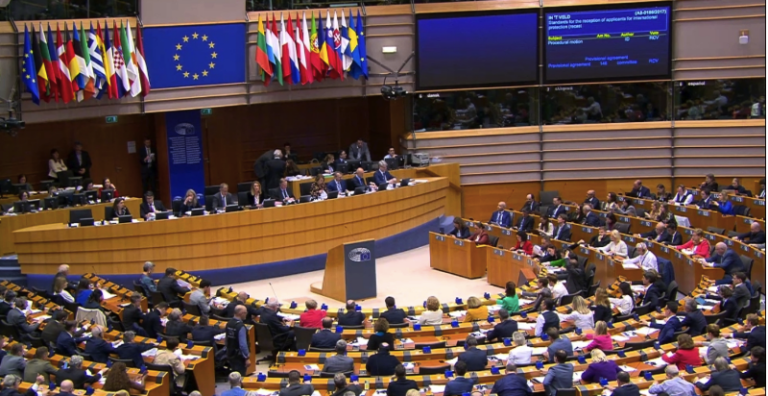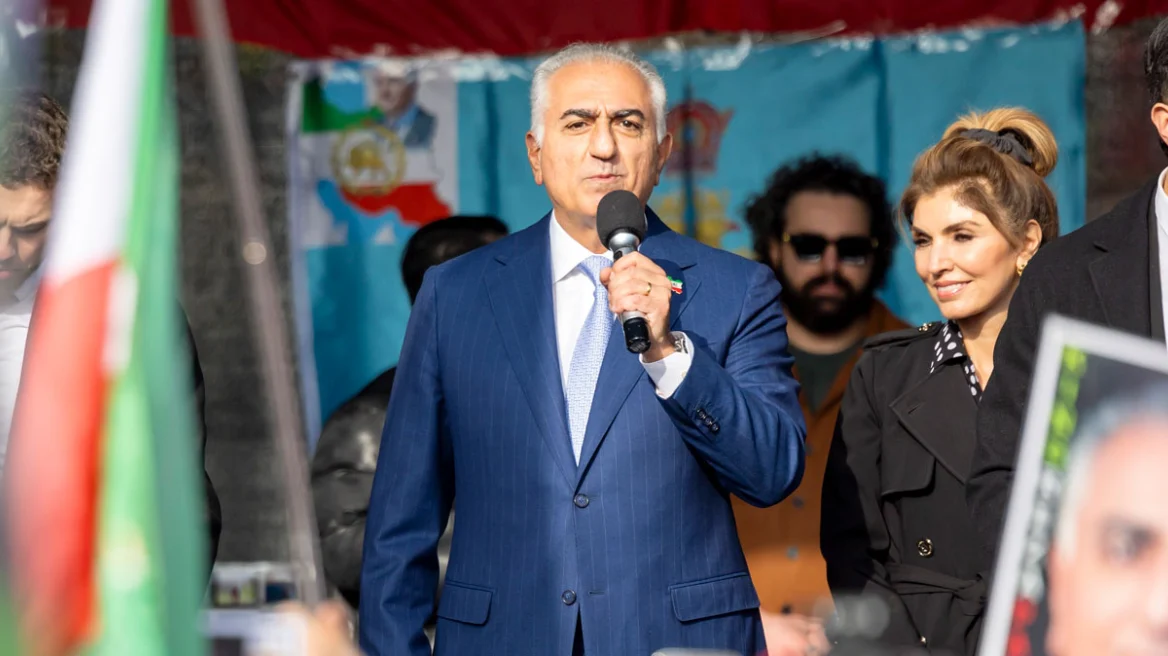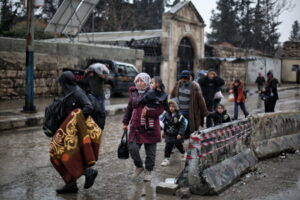The European Parliament has given the green light to the new agreement on Immigration and Asylum, which was put to a vote today (Wednesday 10.4.2024) in the European Parliament.
Despite opposition, MEPs eventually voted in favour of all five legislative texts concerning asylum procedures, management of migration crises and border protection. However, activists in the gallery started shouting, calling for the agreement to be voted down. “The agreement is a killer, vote no,” the activists shouted, throwing tires at MEPs.
“We made history” said Metsola
Immediately after the five pieces of legislation were voted through, European Parliament President Roberta Metsola said “we made history”. In a post on X, she noted that “we have kept our word”, adding that the pact represents a “balance between solidarity and responsibility”.
The European Parliament has voted in favour of the EU Migration Pact which reforms rules on international protection.
Seconds before the vote began, a number of protesters in the viewing gallery began urging politicians to vote no. @muirisoc
Read more: https://t.co/BpQnsXkuie pic.twitter.com/uzLVkZmDkM
— TheJournal.ie (@thejournal_ie) April 10, 2024
Meanwhile, the centre-right celebrated the approval of the migration agreement. MEP Thomas Tobé argued that the European Parliament had “successfully put an end to the political deadlock that has characterised the migration issue for many years. The implementation of the new Immigration Pact will allow us to regain control of our external borders and reduce the migratory pressure on the EU”.
“Historic step” says Olaf Scholz
German Chancellor Olaf Scholz described the vote in favour of the new Immigration agreement as a “historic step” in a post on H.
On the flip side, the Greens criticized the legislation, saying that “with the new migration agreement, the lack of solidarity towards asylum seekers and between member states will only worsen.”
In the same statement, the Greens point out that “real solidarity is about sharing responsibility fairly within the EU and international partners and standing up for our values and fighting for human rights.”
New, common policy on migration
The agreement aspires to establish a new, common policy for managing the reception and resettlement of asylum seekers across the European bloc, seeking to provide a unified response to the issue of migration, after nearly 10 years of crises and individual member states’ responses to the problem.
History made.
We have delivered a robust legislative framework on how to deal with migration and asylum in the EU.
It has been more than ten years in the making. But we kept our word.
A balance between solidarity and responsibility.
This is the European way. pic.twitter.com/OW24Y8cv1k
— Roberta Metsola (@EP_President) April 10, 2024
In the new Immigration agreement, a key element is the introduction of mandatory solidarity, whereby all EU Member States will have to contribute to the management of migration, either financially, by hosting migrants or by providing operational support.
The text of the agreement, after much debate and controversy, includes five laws which, according to the lawmakers, seek “to reform the current rules with an emphasis on cooperation, but also compulsory but flexible solidarity”.
Several MEPs believe the pact will provide relief to countries such as Greece and Italy, which have borne the brunt of migratory flows coming through the Mediterranean sea routes.
The goals of the new pact sound ambitious. However, the regulations it establishes are being met with opposition, with right-wingers considering it left-wing and left-wingers right-wing.
The pact was supported by the three major political groups in the European Parliament (EPP, Socialists and Liberals); on the other hand, pragmatists argue that the text is the best possible at the moment, at a time when the far right is expected to come out stronger in the June European elections.
Margaritis Schinas spoke of a “delicate, balanced result”
Speaking at the European Parliament, Greek Commission Vice-President Margaritis Schinas said that the package of measures contained in the pact was a “delicate, balanced result”.
“We are ready to open the door to a new home, based on respect for fundamental rights, dignity and the values we stand for. Not a fortress Europe, but a well-guarded home with more secure external borders and clearer rules on who has the right to enter. A home that provides refuge to those fleeing persecution, war and violence, where asylum claims are processed fairly and fairly,” he underlined, noting that the new rules would ensure that “those who do not have a legal right to be under our protection should be returned to their countries of origin with speed and dignity.”
What the new agreement provides for
The new agreement on Immigration and Asylum contains provisions covering all stages of the issue, from the screening of irregular migrants and the collection of biometric data to the procedures for processing asylum applications by Member States.
It also has provisions on cooperation and solidarity between Member States and on how to manage crises. In any case, rapporteurs of the Pact made it clear that the five laws are in fact uniform. If the European Parliament were to reject even one of them, the whole Pact would be scrapped.
The new Pact is considered by many to be one of the biggest political dossiers of this mandate. However, the rapporteurs of the Eurogroups admit that there are divisions both between and within parties, so they believe that it is impossible to predict the outcome of the vote.
Language developed 8 times earlier than previously thought, says new book (video)
Who disagrees with the New Agreement
Opposition to the New Agreement has been voiced by well-known figures such as lawmakers from Viktor Orbán’s Hungarian party Fidesz, as well as the right-wing group Identity and Democracy (ID), whose ranks include Italy’s League, France’s National Rally and Germany’s Alternative for Germany (AfD).
At the same time, there are also reactions within the dominant Eurogroups, with the strongest bloc being that of the 16 Italian Socialist and Democrat MEPs.
“No” to the new Agreement also from Italy’s populist Five Star Movement, which considers it useless for its country and detrimental to migrants’ rights, while MEPs from Georgia Meloni’s party “The Brothers of Italy”, co-habiting with the European Conservatives and Reformists (ECR), dominated by the Polish Law and Justice delegation opposing the changes, had announced that they would “examine each file individually”.
Opposition was also voiced by 72 Green MEPs and 37 from the Left, arguing for strict provisions that would water down the asylum procedure and allow violations of fundamental rights.
Ask me anything
Explore related questions





